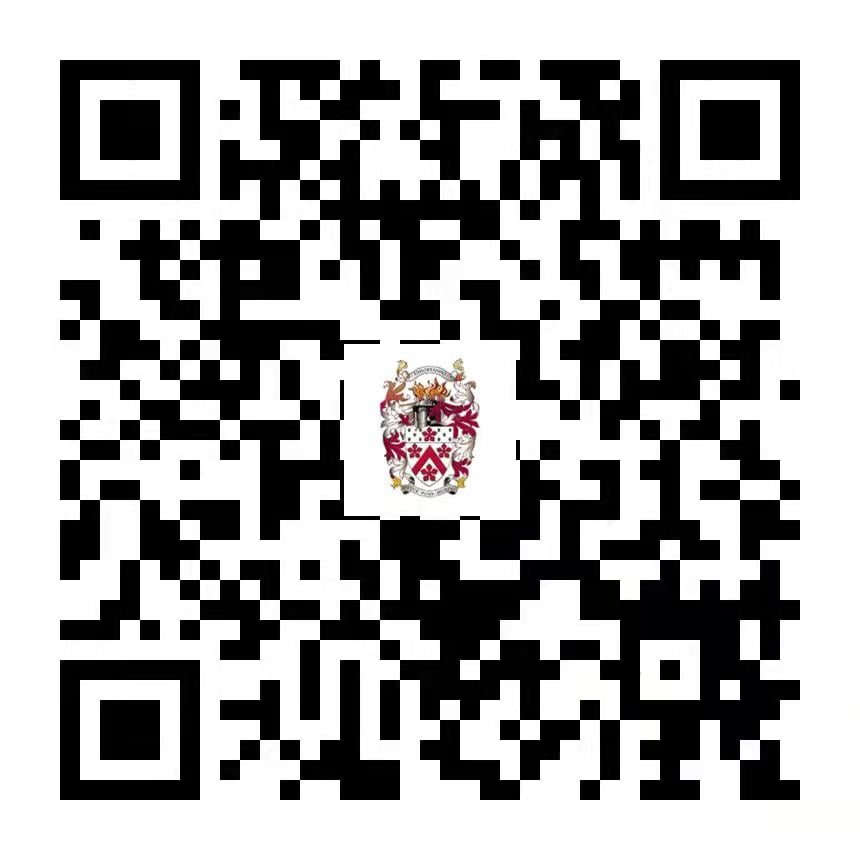Inhale possibility, exhale creativity - harnessing the power of the artist
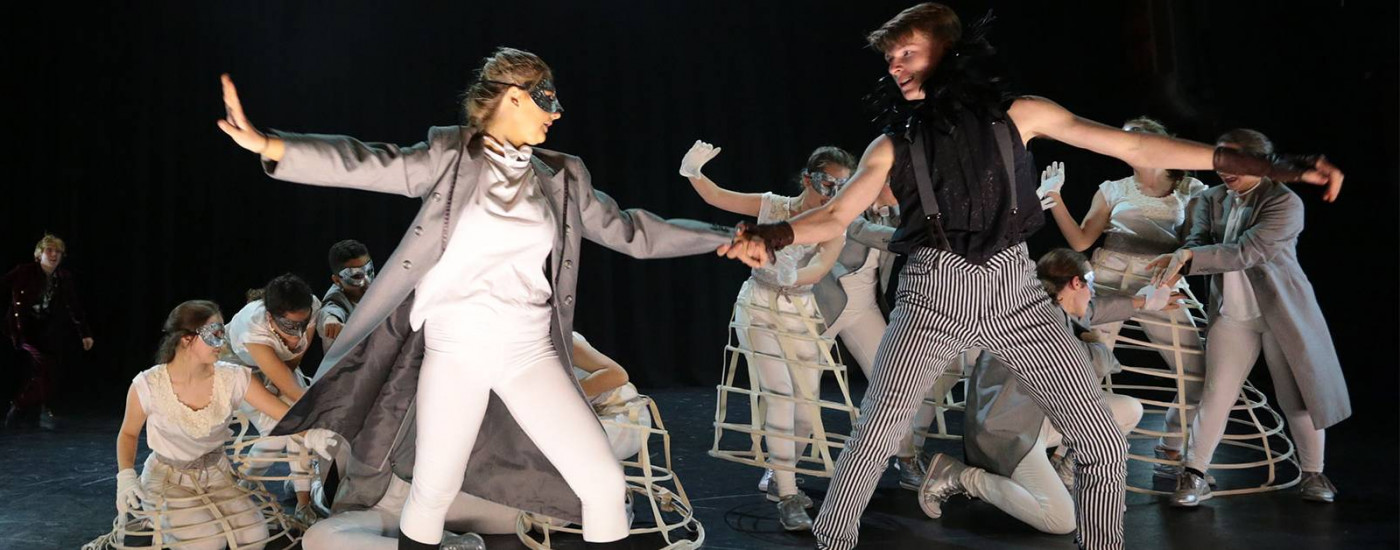
Why do we bring artists into our schools or seek and develop sustainable partnerships with a range of arts organisations?
It is somewhat apt that Dulwich College was founded in 1619, due to the pioneering and entrepreneurial spirit of actor Edward Alleyn, who following a life on the stage, adapted his path and sought new ways to invest in the future of young people. The role of the arts has always been intrinsically linked with learning and education, and yet the debate as to where the arts sit in education or rather how they are recognised, is a debate that has transcended time.
From ritual, the ancient Greeks, through to today, the arts have always been a prevalent force in educating people. By the 19th century when, as society entered a modern era, artistic and creative thinking were already considered powerful forces that promote social progress and cultural development. Despite a global history regarding the impact of arts in society and education, debates about the arts and their place within education still rumble on. This is often affected by incoming and outgoing governments to the recently revoked Russel Group facilitating list of A-levels that failed to include the arts, and is thought to have had a major role in the devaluing of the arts.
The Guardian newspaper reported that Jacqui O’Hanlon, chair of the Cultural Learning Alliance and Director of Education at the Royal Shakespeare Company, welcomed the Russell Group move, saying that the advice on facilitating subjects had unintentionally devalued arts subjects and led to a decline in time spent teaching the arts in schools.
She said: “We hope that this important move by the Russell Group makes a significant contribution to changing perceptions of the value of arts subjects in the English education system. Scrapping the old facilitating subjects list and providing comprehensive, nuanced and interactive guidance is a clear message to students, parents and schools: studying the arts can offer a route to a wide-range of different careers and fields of study.”
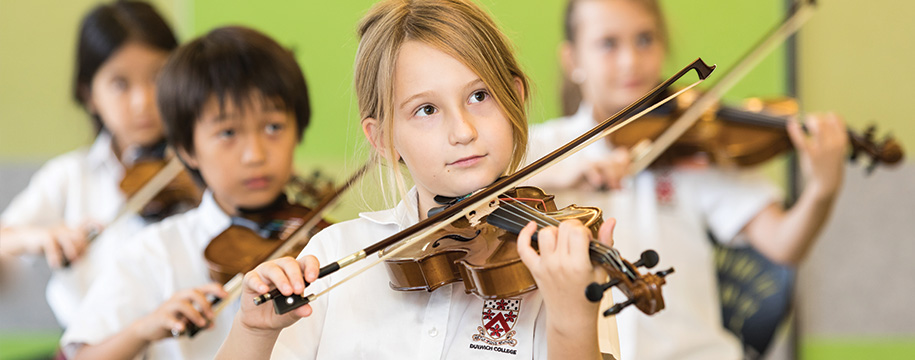
Despite these ongoing debates in the UK and the uptake for the arts in many state schools diminishing, Dulwich College International (DCI) has always had a strong commitment and understanding that the arts play a vital role in education and learning. Being part of a large family of schools has furthered opportunities for all students to have an entitlement to the arts in a range of ways, from internal arts festivals, to creating arts programmes like International Schools Choral Music Society (ISCMS) where we share a value of music with other schools across Asia, to programming professional artists to work in our schools while developing and managing sustainable partnerships with the likes of Royal Shakespeare Company (RSC). Equally being part of an education team where there are ongoing debates with colleagues regarding the purpose of a 21st century education, has helped the ongoing reflection of the arts across Dulwich. The amazing process of interviewing over 5,000 students this year across DCI, has equally further highlighted or perhaps endorsed that our commitment to an arts entitlement for every student is not misguided. In fact, there is great value beyond a broad arts curriculum in the skills and active approaches that many teachers of the arts naturally do within our schools.
How do we define the importance of arts education or broader still define creativity?
The report A Time to Listen focuses on the student voice as well as the teachers. The RSC, Tate, Nottingham University and TALE (Tracking Arts Learning and Engagement) analysed 6,000 responses from young people 14-18 years, tracking students and 63 teachers over 3 years. Through voices and opinions of young people, the depth and breadth of research gave significant new insight into the positive difference sustained engagement with arts and cultural education has on the lives of young people. One area of this report quotes:
Young people tell us that arts and cultural learning in school is significantly different because:
- In arts lessons they have more agency, responsibility, independence and freedom to make decisions. They enjoy and are motivated by this
- They often see the arts as a valve for releasing the pressures they experience elsewhere in their lives. They say that this improves their health, wellbeing and happiness
- Arts and cultural learning is open ended and experimental, there is no right or wrong. They value having to develop and support their own views and opinions
- They have a different relationship with their teachers because of the ways they are taught
This particular report focuses on the arts in UK schools, but during our interviews with DCI students, similar views were voiced regarding their positive learning experiences across many subject areas, both arts and non-arts, where similar agency, value and student/teacher relationships were prevalent.
An article posted by the England Arts Council states that: ‘Experimental thought would be impossible without creative scientists imagining new hypotheses, and the arts would be infinitely poorer without practitioners who can think methodically and apply technological advances to their work.’ In essence we need to have a more balanced approach to our understanding of creativity, especially knowing that art and science, influence and depend on one another.’
In our recent debates about an education that prepares our students for the 21st century, it is clear that we must drive positive change using our expertise across the group, and be mindful of change in our learning culture.
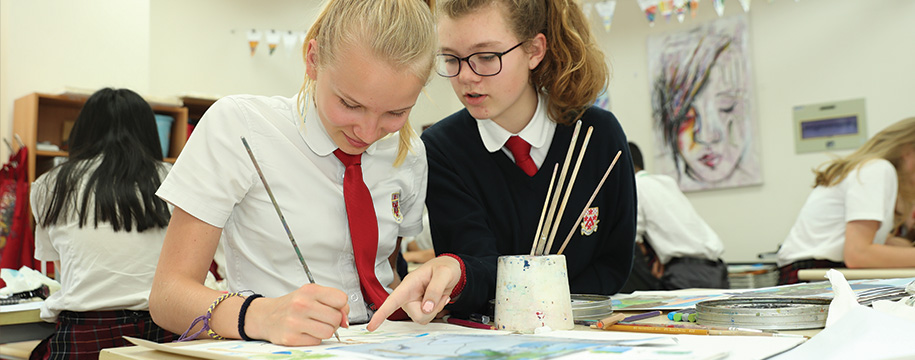
Chief Executive of the British Arts Council Darren Henley, points out ‘there would be no original ideas, no advances in science and medicine, no new products or services, no solutions to emerging problems. Without creative scientists, politicians and entrepreneurs we would not have any of the great inventions of the last hundred years. It would simply not have been possible to invent the television, or the Internet, or the smartphone without envisioning a different world and imagining something, which had never been seen before. Creativity matters in every aspect of our lives, so it is bizarre that we so often take it for granted’.
It is important to recognise that creativity drives innovation in all areas of life. To keep up with the pace of all technological changes occurring in the world, we need to be equipped with the right creative skills. As humans we have developed so fast and made so much progress, but it is thought that our greatest successes to date could potentially turn into failures, due to a lack of creativity. Knowledge is now capable of being shared all over the world and as a result this has accelerated unpredictable changes across society, and indeed calls for us to catch up, reevaluate and evolve the way in which we teach and prepare students for life.
Artists in our schools
As learning cultures change and evolve, the arts are well placed to help drive positive change. Dulwich College International has always placed great value on the arts, and indeed at recent conferences attended, our Diversity Arts Programme, inter-school arts festivals and our partnerships and collaborations with the likes of RSC Education and Vienna Boys Choir (to name just two) placed us in an enviable position amongst teachers from schools across the globe. The arts sit as part of the centre of our education philosophy and align with our education strategy. Dulwich College International has a commitment to ensure that every student has an entitlement to a broad arts education.
Principles:
- Pursuit of the arts is a staple of school life: A holistic education equipping our students with both core and transferable skills to be ‘Worldwise’ therefore we are committed to providing a vigorous arts programme.
- To ensure that every student has an entitlement to an arts education: Students study the arts as part of the academic curriculum throughout their school life, and students in the older year levels are highly encouraged to take IGCSE, IB or A Level in an arts subject. Drama is a core subject in our International High Schools throughout the student journey
- Provide a context to the arts in industry and higher education: The vibrant arts culture of visiting professional arts practitioners, interns, performances and events is carefully planned to develop and enhance, not only the co-curricular life of the school, but also the academic curriculum.
- Provide a professional perspective in a learning environment for the students: As part of the Dulwich College International network, we are able to offer students opportunities that a single school would not have the capacity to provide. Some of these opportunities, such as the Dulwich Festival of Music and the Dulwich Science Art Photography Competition, focus on a single artistic discipline, while others, like the Arts Diversity series and the MADD Festival, are broad ranging.
- Provide external arts provision in the form of artists and companies working with our students: Cultivated collaborative relationships and partnerships with top educational and artistic institutions throughout the world, offering students direct access and exposure to creative industries, while developing transferable skills that will prepare them for life after Dulwich.
- Promote collaboration and inspire curiosity: Our partners and visiting artists help students connect learning to the real world, promote collaboration and help inspire curiosity and a love of learning
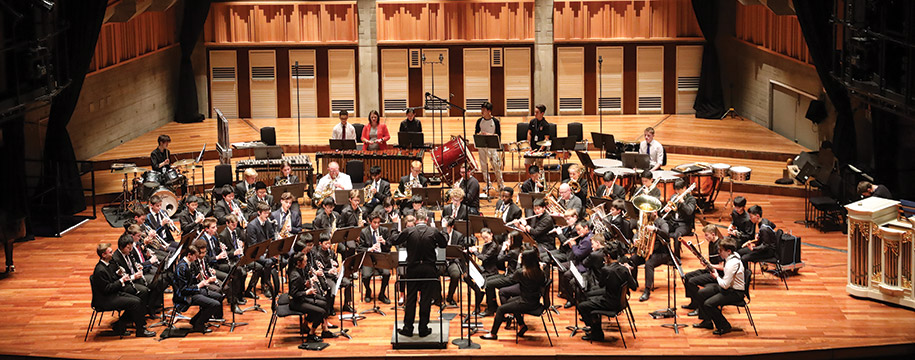
In A Time to Listen, the report suggests that part of the success criteria for an Arts and Culture Rich School is that, the school enjoys partnerships with one (or more) arts and cultural organisation. Teachers are often inspired by these partnerships and particularly value:
- Access to new professional and disciplinary knowledge and skills
- The chance to develop sustainable partnerships over time
- The opportunities that partnerships provide to build local engagement in arts and culture
This is not news for DCI. We have built a strong programme of visiting artists and constantly seek the right partnerships and collaborations for our students. Working with our students, external artists can measurably impact students and staff by providing an experience in and beyond the classroom that connects their learning to the world they live in.
We have a wealth of evidence-based research by some of our partners and leading organisations regarding the potential impact of arts in education and external artists working in schools. This said, visiting artists and partnerships go beyond the arts. Too often residencies or opportunities can be seen or placed as extracurricular, arts specific or disconnected to the broader curriculum – an add on! In fact, at DCI we are developing a learning culture that breaks down this linear thinking and engages with the transferable and cross disciplinary skills that our partnerships and Diversity Arts Programme offer to the learning culture as a whole.
Being part of the Dulwich family of schools every student, regardless of school size, location or demographics, has access to a diverse range of world class practitioners that schools may not be able to provide by themselves.
Programming artists to work in our schools, we create opportunities to unlock individual student potential through exposure to a breadth of experience and a depth of expertise.
Types of practitioner impact varies from building core skills, directly impacting the curriculum or exposing students to a new and valued aesthetic experience (live performance/art).
Our partnership with RSC Education not only illustrates some of the key attributes of having visiting practitioners in our schools, but the integration of theatre based practice as complementary to the spectrum of active approaches to teaching Shakespeare. Using the focus of Shakespeare, these approaches, referred to by RSC Education as rehearsal room pedagogy equally offer transferable skills and active approaches to learning that can be applied across our curriculum.
Rex Gibson, a key developer in active approaches for school study of Shakespeare, defines his active methods:
Active methods comprise a wide range of expressive, creative and physical activities. They recognise that Shakespeare wrote his plays for performance, and that his scripts are completed by enactment of some kind. The dramatic context demands classroom practices that are the antithesis of methods in which students sit passively, without intellectual or emotional engagement. Shakespeare is not a museum exhibit with a large ‘Do Not Touch’ label, but a living force inviting active, imaginative creation. Active methods release students’ imagination and involve them in speaking and acting. Such action gives force and substance to the discussion, writing and design work that students undertake. It helps them to make Shakespeare their own, as they inhabit the imaginative worlds of the plays through action. Direct experience of Shakespeare’s language allows students to feel its distinctive forms and rhythms, and to respond with a real sense of personal engagement. Active methods dissolve the traditional oppositions of analysis and imagination, intellect and emotion. They encourage informed personal responses, which are both critical and appreciative. In active work, students combine critical thought with empathy, confidence with a willingness to suspend judgment. Interpretations do not have to be of the narrowing ‘either…or’ type but can be the more expansive and imaginative ‘both…and’ variety.
While the focus and basis of our partnership with RSC Education is engaging with Shakespeare, it also allows for a reflection and debate on the culture of learning and teaching. The RSC Education work closely each year with a broad range of our staff, exploring and deconstructing rehearsal room pedagogy. In order for the partnership to have a sustainable impact in our classrooms, year on year staff build on their knowledge and application in their classrooms. This year we are really pleased that staff who have attended the RSC Education professional learning for the past two or three years, will have the opportunity to access the RSC Certificate in Teaching Shakespeare. This course builds on their knowledge of rehearsal room pedagogy, and culminates in a piece of action research. Those on the certificate course will also run additional workshops to share practice in their own schools and with other staff across the group.
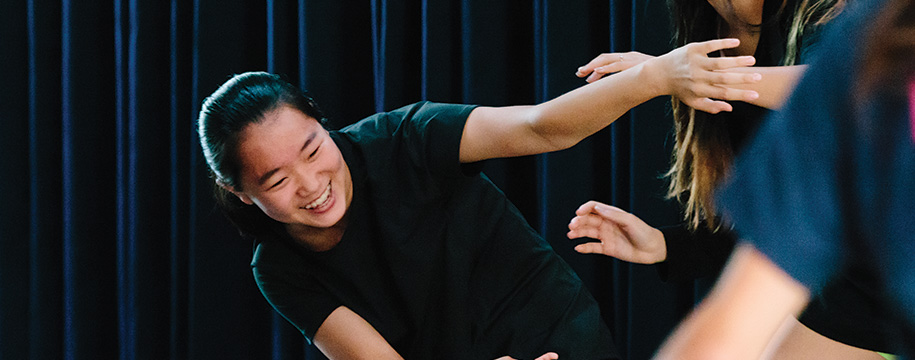
Why rehearsal room pedagogy?
The relationship between a director and their actors is analogous to that of a teacher and their students.
There is a palpable correlation in the relationship between professional (expert) director and actor and Hattie’s theories of the ‘expert teacher.’ While a director may be deemed to be working with a set of adults who it can be assumed bring with them talent and motivation, a teacher most likely will be working with a wide spectrum of ability, age, language acquisition and motivation. However, the mode for theatre based practice as Dr Tracy Helen Irish quotes in her thesis The educational value of working with Shakespeare through theatre-based practice' is in reducing these differences through dialogic, inclusive exploration to build meaning, which values plurality of experiences in the room….the impact of relationships requires careful management in both cases and can be key to successful practice”. Hattie’s definition of an ‘expert teacher’ can apply to an expert director and actor's ability to respond adaptively and flexibly in the moment as a result of high levels of preparation and motivation. They both continually review and revise their practice.
Michael Boyd, former Artistic Director of the Royal Shakespeare Company put great emphasis on the ensemble, and collective in the rehearsal room, believing that the purpose of rehearsals is ‘to learn and make art at the same time’. Through his work he developed ‘a set of values and behaviours’ or conditions for ensemble working:
- Cooperation: the intense unobstructed traffic between artists at play; the surrender of self to a connection with others, even while making demands on ourselves
- Altruism: the moral imagination and the social perception to realise that the whole is greater than the sum of its parts. The stronger help the weaker, rather than choreographing the weak to make the strong look good.
- Trust: the ability to be appallingly honest, and to experiment without fear.
- Empathy: caring for others with a forensic curiosity that constantly seeks new ways of being
- Imagination: keeping ideas in the mind long enough to allow them to emerge from the alchemy of the imagination and not the factory of the will.
- Compassion: engaging with the world and each other, knowing there may be mutual pain in doing so.
- Tolerance: accommodating differences and allowing mistakes.
- Forgiveness
- Humility: the expert who has nothing to learn has no need for creativity because the answer is already known.
- Magnanimity: the courage to give away ideas and love, with no thought of transaction or an exchange in return.
- Rapport: the magic language between individuals in tune with each other.
- Patience: this is only really possible over years. Art can be forced like rhubarb, but it tends to bend in the wind.
- Rigour: dancers and musicians take life-long daily training for granted, and theatre could do with catching up.
- Together and creating together.
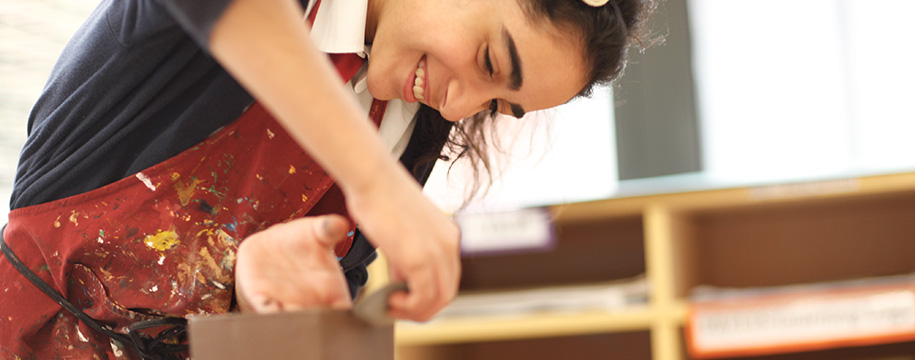
While this may seem idealistic, the way in which an ‘expert’ director like Boyd works with his actors, can correlate with Hattie’s definition of the expert teacher:
a. ‘Can identify the most important ways in which to represent the subject that they teach’
b. ‘Are proficient at creating an optimal classroom climate for learning’ – where the key word is ‘trust’ so that risk taking can occur.
c. ‘Monitor learning and provide feedback’ – with a constant alertness to the needs of each student in their care and the flexibility to respond accordingly and dialogically rather than through prescribed systems of accountability.
d. ‘Believe that all students can reach the success criteria’ – this translates into the hard to define quality of ‘passion’ in teachers, for the growth of their students, not just for their subject areas.
e. ‘Influence surface and deep student outcomes’ – where deep learning builds on surface learning to create integrated learning through a continuity of experience.
Key to this is the positive relationship between the teacher and their students where trust exists, which occurs when students recognise a high level of competence and integrity in their teacher alongside a personal regard and respect for them as an individual. Just like the rehearsal room, ‘a positive caring, respectful climate in the classroom is a prior condition to learning’ as Irish says. ‘An ensemble of teachers and students requires not just trust but respect for the plurality of perspectives. It depends on sharing of meanings through analogies and an acknowledgement of the value of analogy and narrative in how we learn’
Hattie says:
‘We learn best by interacting with ideas, by deliberately rephrasing the ideas, and finding ‘coat hangers’ to link to previous notions (or examples) . . . stories and example cases tend to be remembered better than facts and abstract principles’
In relation to bringing artists into our schools, when we select artists to come into a DCI school, we seek artists who can engage with our students and teachers and using their expertise create a safe environment where students can experiment with new found skills, critically decipher new disciplines, make connections to their learning and the world about them. In essence artists bring a new dynamic into the classroom whereby teachers and students have an opportunity to learn together, and embark on a journey of discovery as an ensemble. Students have the opportunity to work alongside teachers as learners, and teachers have an opportunity to observe students in new and different contexts. The relationship and trust between the artist and teacher during preparation prior and during the residency is equally important to impact student learning. An artist’s residency or visit is also a professional learning opportunity for staff. Just like our students, our teachers can make new discoveries and connections across the curriculum, and discover or adapt their own pedagogy and ways of working should they wish.
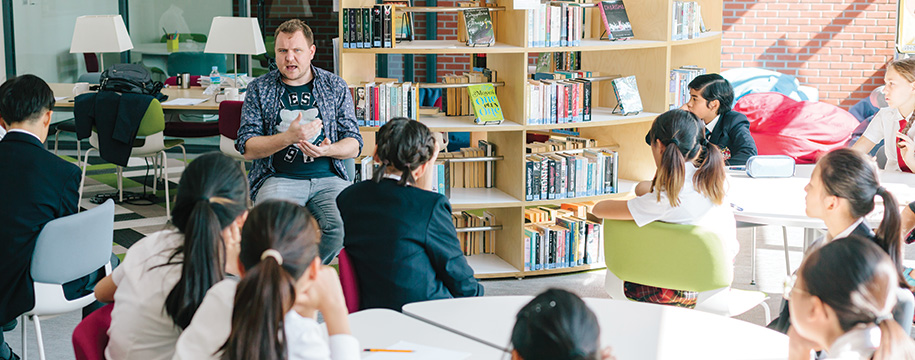
The impact of live performance
When looking at the impact of our arts agenda and artists in our schools, we must also be wary of losing sight of the aesthetic quality of receiving arts. To watch and be part of an audience experiencing an arts event can have an unforgettable and valuable impact on students. We must be conscious that we do not lose sight of the importance and joy that a live arts performance can have on every student as an audience. Where there is also a further more personalised relationship with the artists performing, the impact of a live arts event such as the Vienna Boys Choir, or watching Roy McGrath's band (Diversity 2017 & 2019) becomes heightened. There is a given learning experience that the aesthetic quality of a simply attending a live arts event has. Regarding theatre, Cicily Berry says ‘this is where theatre plays such a valuable and necessary role in our culture today, for it can take people into that other world, it can plug into our imagination, and, most important, it can provoke us and make us want to talk, to discuss, to think – to communicate through language.’
“the encouragement of creativity from an early age is one of the best guarantees of growth in a healthy environment of self-esteem and mutual respect - critical ingredients for building a culture of peace.”
- UNESCO
Through our commitment for every student to have an entitlement to the arts across our schools, our enviable Diversity Arts Programme, collaborations and partnerships with RSC Education, Royal Northern College of Music, Vienna Boys Choir, Berklee College of Music, University of Auckland Dance Studies we are well placed for the arts to play an integral role in driving positive change that prepare our students to be Worldwise.
“Imagination is more important than knowledge. For knowledge is limited to all we know and understand, while Imagination embraces the entire world, and all there ever will be to know and understand”
- Albert Einstein
Author: Sarah Barker-Doherty
Connect with us




